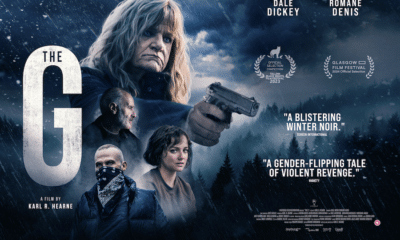Dylan Mohan Gray’s debut feature FIRE IN THE BLOOD was the first of many documentaries that caused huge reaction in 2013. It caused a stir at 2013’s Sundance Film Festival and as the documentary gears up for its DVD release, it has still got people talking. We speak to director Dylan Mohan Gray to talk about the documentary, and just how the plight that FIRE IN THE BLOOD shows is far from over.
Q. This film has definitely makes an impression, what has the reaction been?
It has been really, truly wonderful. Making this film was a very long, tough journey, so the immensely positive response it has received has been incredibly gratifying for all of us who toiled for years on it.
Q. It is honestly quite shocking that this story was never documented on screen until ‘Fire In The Blood’ – Is that why you wanted to make this film?
That was a very big part of it. Of course it represents a great opportunity to be the first to tell such an incredibly important and dramatic true story in any sort of comprehensive way, but at the same time I definitely had a lot of sleepless nights because of the enormous weight of responsibility I felt not to make a hash of it.
Q. One thing that stuck with me is George Bush’s role in getting cheaper drugs. How important is it to be objective, despite the public perspective?
I don’t really believe in polemic. The fact that President Bush is seen by pretty much everyone who knows about the issues dealt with in the film as having played a far more positive role while in office than either Bill Clinton or Barack Obama comes as a surprise to many viewers, but that in and of itself is very helpful in getting them to question some of their preconceived notions. People make a lot of incorrect assumptions which end up being obstacles to meaningful change. The idea that there is such a thing as a progressive political element dedicated to protecting the public from corporate greed, abuse and even genocide is, in my opinion, thoroughly untrue. The left is just as bad as the right, at least in countries like the US and UK, and in many cases unquestionably worse. People think that their interests are being defended by people who are busy doing the exact opposite. That having been said, I wouldn’t want to give anyone the impression that President Bush played a particularly positive role in terms of either AIDS or access to medicine. He was just slightly better than the others.
Q. Alongside professionals, you also include stories of people with HIV/Aids. Are you still in touch with any, how are they doing?
My colleagues and I are in touch with most of them, and all are doing very well.
Q. This was your first feature project.Was it the one you were hoping to make your debut on?
Yes, Fire in the Blood is my first feature-length film as writer-director, it’s true. I’ve been in the industry for quite a while and it might have been another project, but happened to be this one. I felt very passionate about making this film, much more so than certain other projects I could have debuted with, and the film has been exceptionally well received, so in that sense I suppose it’s good that this was the first. It’s obviously a lot harder to get future projects off the ground when your debut doesn’t get noticed… many people only get the one chance to do a feature, so it’s obviously important to seize the opportunity and put everything you have into it.
Q. Fire in the Blood is unapologetically honest for good reason. After the release we have seen other documentaries like Blackfish doing the same thing, and changing people’s perception. Do you feel we’re in a new age of the documentary?
It’s certainly an exciting time for docs. I think every age needs to be new for any creative form. We live in a time, however, when serious journalism appears in some sense to be in its death throes, and the public increasing relies on documentaries to provide rigorous, longform investigation of crucial social questions and to cast light into spaces where many in power would prefer the public to know as little as possible about what is really going on.
Q. The end of the film finishes with a warning saying the battle is not over yet. A year on…is this still the case?
The outlook is unquestionably much grimmer today than it was a year ago. The feeling is very strong among those who work on these issues that we may well be right on the precipice of a holocaust where access to medicine is concerned. As it stands, hundreds of thousands of people are dying literally every week because they can’t get the medicines they need, and before long we may look back at the current numbers with morbid nostalgia.
Q. What are you working on next?
I have a couple of projects I’m trying to flesh out, but I haven’t started trying to raise funds for them yet, which is what really determines what comes next. I am also very much open to approaches from others, and have had a few interesting ideas floated my way. The success of this and the networks of colleagues and supporters we were able to build around the project gives me a lot of confidence in terms of what can be undertaken and achieved, so I’m definitely looking forward to sinking my teeth into new work which can ignite similar passion and fervor.
FIRE IN THE BLOOD IS AVAILABLE ON DVD 24th MARCH. Check out our review and coverage here.
TV and Theatre Nerd who will always try and give you a good opinion, unless it is something to do with Bloc Party, then it will be completely biased. Favourite films include: HEDWIG & THE ANGRY INCH, ALMOST FAMOUS AND MY OWN PRIVATE IDAHO.

Latest Posts
-


Film News
/ 2 days agoRelease date announced for sci-fi drama ‘Sky Peals’
A UK release has been announced for Sky Peals following a debut on the...
By Paul Heath -


Amazon Prime
/ 3 days agoAmazon’s ‘Red, White & Royal Blue’ with Nicholas Galitzine and Taylor Zakhar Perez is getting a sequel
Ahead of Amazon’s inaugural upfront presentation on May 14, Amazon MGM Studios has confirmed...
By Paul Heath -


Home Entertainment
/ 3 days agoApplauded ‘Snack Shack’ set for home debut in June
Snack Shack has had a home release date set for June in the UK....
By Paul Heath -


Film News
/ 3 days agoRelease date set for brilliant drama ‘The G’ with Dale Dickey
A release date for the brilliant crime drama The G has been set by...
By Paul Heath















